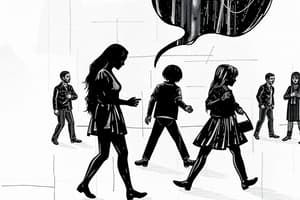Podcast
Questions and Answers
Formal social control is enforced by unofficial groups or individuals.
Formal social control is enforced by unofficial groups or individuals.
False (B)
Informal social control is less influential than formal social control.
Informal social control is less influential than formal social control.
False (B)
Crime control is an example of informal social control.
Crime control is an example of informal social control.
False (B)
Social norms are often codified and officially acknowledged.
Social norms are often codified and officially acknowledged.
Deviance refers to behavior that violates established social norms.
Deviance refers to behavior that violates established social norms.
Crime control exclusively focuses on punishing criminal behavior.
Crime control exclusively focuses on punishing criminal behavior.
Social norms are individualized guidelines for behavior that do not influence social control.
Social norms are individualized guidelines for behavior that do not influence social control.
Deviant behavior is always pathological and universally condemned.
Deviant behavior is always pathological and universally condemned.
Formal social control includes parental monitoring as a mechanism to prevent deviant behavior.
Formal social control includes parental monitoring as a mechanism to prevent deviant behavior.
Deviance is considered relative, meaning behaviors vary in acceptability across different cultures.
Deviance is considered relative, meaning behaviors vary in acceptability across different cultures.
Flashcards are hidden until you start studying
Study Notes
Understanding Social Control: Formal, Informal, and Deviance
Social control is a fundamental concept in sociology, illuminating the mechanisms by which society maintains order, norms, and expectations. To appreciate social control's complexity, let's delve into its various facets: formal social control, informal social control, crime control, social norms, and deviance.
Formal Social Control
Formal social control refers to the enforcement of norms and expectations by institutions and agents of the state, such as governments, courts, police, and schools. These entities wield the authority to punish transgressions, enact laws, and impose sanctions. Formal social control is explicit, and its norms and rules are often codified and officially acknowledged, such as laws against theft or traffic violations.
Informal Social Control
In contrast, informal social control is the unofficial, yet no less influential, efforts of individuals, groups, or communities to maintain norms and expectations. These unwritten rules and codes of conduct may involve peer pressure, gossip, or other social sanctions. Informal social control operates through social networks, workplace norms, and community values. Examples range from the pressures to conform to the fashion norms of a peer group to the expectations of behaving respectfully in a family setting.
Crime Control
Crime control is a specific form of formal social control that focuses on preventing, investigating, and punishing criminal behavior. It includes legislation, policing, and the judicial system, as well as other forms of delinquency control, such as parental monitoring and education.
Social Norms
Social norms are shared expectations about behavior that are considered acceptable, appropriate, and desirable by members of a given society. They are internalized by individuals and serve as a guide for their behavior. Social norms can have significant influence on social control, as they reflect the values, beliefs, and expectations of society. When social norms are violated, individuals may face formal or informal punishment.
Deviance
Deviance is the behavior that violates social norms. Deviant behavior can range from minor infractions, such as jaywalking, to more serious offenses, such as murder. Societies often employ social control to discourage deviant behavior and reinforce social norms.
Deviance is a complex and multifaceted concept. Some theorists argue that deviance is relative, meaning that what is considered deviant in one culture may be acceptable in another. Additionally, deviance can be both normative (widespread) and pathological (rare). For instance, while smoking has become less normative in many societies, it is still widely practiced in others. Likewise, murder is a rare, but universally condemned, form of deviance.
In conclusion, social control encompasses a variety of mechanisms for maintaining norms and expectations within society. By understanding formal and informal social control, crime control, social norms, and deviance, we can better appreciate how societies function and the complex interplay of forces that shape our behavior.
Studying That Suits You
Use AI to generate personalized quizzes and flashcards to suit your learning preferences.





